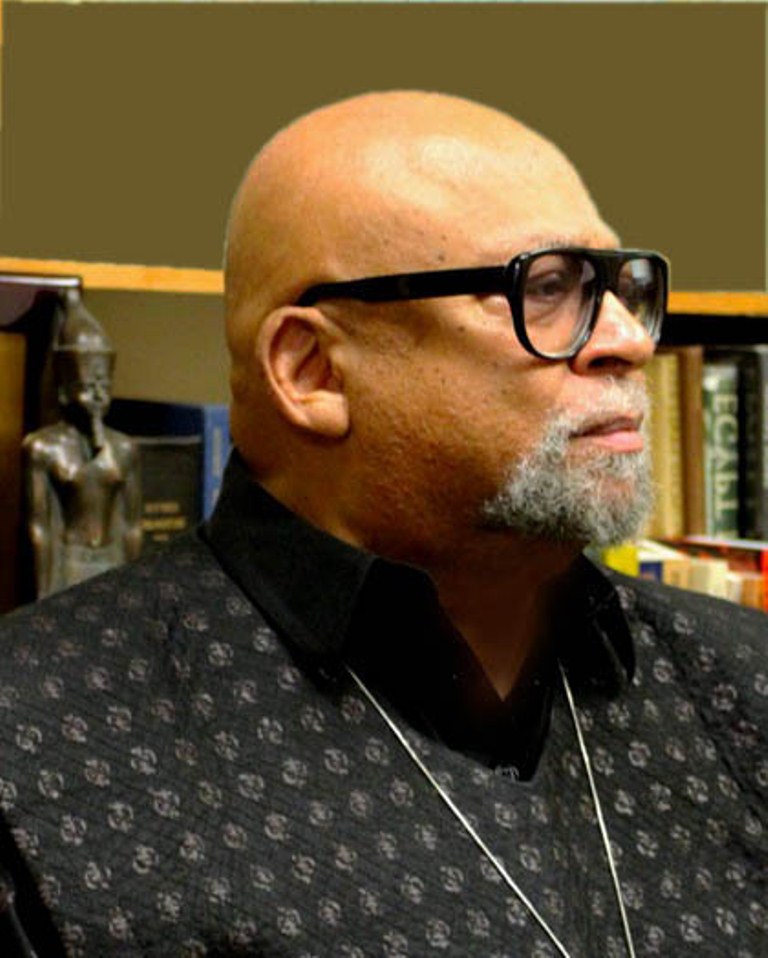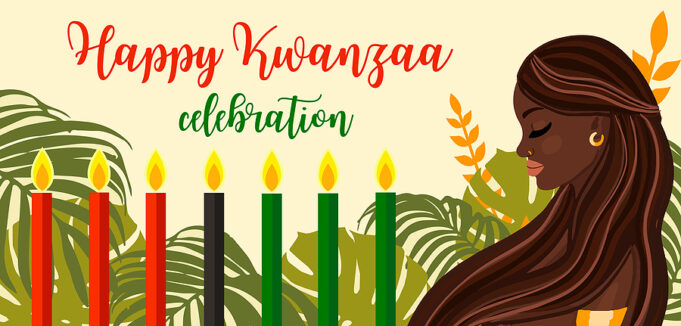When you think of Kwanzaa, what comes to mind?
Creator Dr. Maulana Karenga wanted the national holiday to honor seven critical principles: unity, self-determination, collective work and responsibility, cooperative economics, purpose, creativity and faith. In past Kwanzaa celebrations, large gatherings and community events were something to look forward to. The Covid-19 pandemic has brought challenges for physical gatherings but not blunted the deep meaning and joy of the celebration.
The seven-day holiday begins Sunday, Dec. 26, and ends Saturday, January 1, 2022. Its name comes from the Swahili phrase “matunda ya kwanza” meaning “first fruits.” It is related to harvest time and community. Typically, families and friends gather nightly for the celebration of one of the seven principles every evening or every day. The cardinal Kwanzaa principles are called the Nguzo Saba.
“These principles are appropriate for us to practice whether we are at a community center or if it was just a mother and father,” said Nation of Islam Student Minister Demetric Muhammad of Muhammad Mosque No. 55 in Memphis.

“Dr. Karenga’s pioneering work in Kwanzaa most certainly should be continued; however, I would say we need to take it a step further. These principles are too broad and powerful to be relegated to just seven days. These principles of Kwanzaa don’t conflict with the Bible, with the Holy Qur’an. I think without a doubt Kwanzaa is a tradition we have created indigenous to the Black experience and represents our awakening to our power, and our duty as a people to create our own observances that replace the holidays and observances that were imposed on us during enslavement.”
The principles of Kwanzaa allow for anyone, anywhere to analyze and improve themselves by practicing them, he continued. “In real simplistic terms, you can make a bowl of bean soup for yourself or a pot to feed the entire community.”
Dr. Karenga told The Final Call that he created Kwanzaa in 1966 “as an instrument of struggle, to raise and cultivate the consciousness of the people, to unite them around principles that anchored and elevated their lives and involve them in the struggle to be themselves and free themselves and build the just and good world we all want, work for and deserve.”
He believes that despite the challenges brought on by the pandemic Kwanzaa holds significant meaning.
“Indeed, we face added injury from the pathology of continuing oppression, which marks, mars, overtaxes and too often takes our lives,” Dr. Karenga continued. “Still, we cannot and must not despair or let ourselves be undone or defeated. And Kwanzaa’s insistence on celebrating the good in spite of the dangerous, difficult and demanding times in which we now live our lives, do our work, and wage our struggles offer us an essential foundation and way forward.

“My hope for this Kwanzaa and always is hope for the victory of our people in their righteous and relentless struggle to be themselves and free themselves and with other oppressed, progressive and struggling people achieve a constantly expanding realm of African and human good and the well-being of the world.”
Graphic designer Jabril Malik Muhammad plans to celebrate Kwanzaa by hosting a virtual sip-and-paint event Dec. 25 in which participants will learn to paint the Kwanzaa candleholder called a kinara. Each day a candle on the kinara is lit as part of the weeklong celebration.
“For Black people in America, the Kwanzaa celebration is a restorative practice that can establish a universal culture between Black people all over the earth,” he said.
The Nguzo Saba have been the means by which Black people are thriving during this pandemic. For example, through the practice of umoja (unity), we have represented a resistance to mandatory vaccines,” Mr. Malik Muhammad continued. “Through kujichagulia (self-determination), we have started businesses that provide goods, services and employment to our people. Through ujima (collective work and responsibility), we have worked together responsibly to provide effective treatment for Covid-19.
Through ujamaa (cooperative economics), we have purchased land for housing and farming together. Through nia (purpose), we have become realigned with our communal goal of independence. Through kuumba (creativity), we have found new ways to connect and uplift the cultural values of our community. Finally, through imani (faith), we have endured loss and remained patient through uncertain times. Moving forward, observers of Kwanzaa should find creative ways to celebrate and promote this holiday everywhere.”
Deborah of Kwanzaa First, a Facebook group dedicated to promoting Kwanzaa-focused events and sharing its principles, agreed. “Many of our brothers and sisters have voiced to me through messages and comments that (our) page has made them better people and how their lives have improved because of it, yet I attribute this improvement of self to the principles. I have also become stronger and more aware because of my administration of (our) page when I practice the principles,” she told The Final Call in an interview. She also preferred to only give her first name.
She further noted that Kwanzaa especially gives to Black Americans a sense of identity.
“This is how and why Kwanzaa was created, because Blacks did not have a holiday of our own. The African additions were reflective of the 1960s but it is an American Black holiday because while everyone else has holidays, including Africans, we had none,” Deborah added. Kwanzaa is now celebrated internationally.
This year Kwanzaa celebrations will include virtual get-togethers, in-person but socially-distanced events and mixtures of the two. A simple internet search will reveal dozens of Kwanzaa-themed activities and events to enjoy.
Cassiopeia Uhuru, creator of TheBlackMall.com, based in Chicago, said although there are limitations to how Kwanzaa can be celebrated due to the pandemic, she believes the Black community can still benefit and thrive by observing it. In past years, she has organized Kwanzaa events but isn’t doing that this year. But, she said, Kwanzaa is important and people should find ways to observe and enjoy it.
“Kwanzaa is the time of the year where all the people with like minds just connect,” Ms. Uhuru told The Final Call. “It gives us the opportunity to celebrate with one another. The mainstream media inundates us with poverty and jail and all the horrible things that come out of our communities.”
“We even benefited from having to sit, refocus and really prioritize what is really important. Our people are amazing and cultural and full of life but because we don’t live in traditional ways, we don’t have this one place. We sing, we laugh, we dance together,” she observed. But, Kwanzaa lovers noted, whether via Zoom, Facebook or in-person, there are no limits to how Kwanzaa can be celebrated. Its principles are meant to help us unite and grow with one another which can never be taken away.
For more information on Kwanzaa, visit officialkwanzaawebsite.org.













